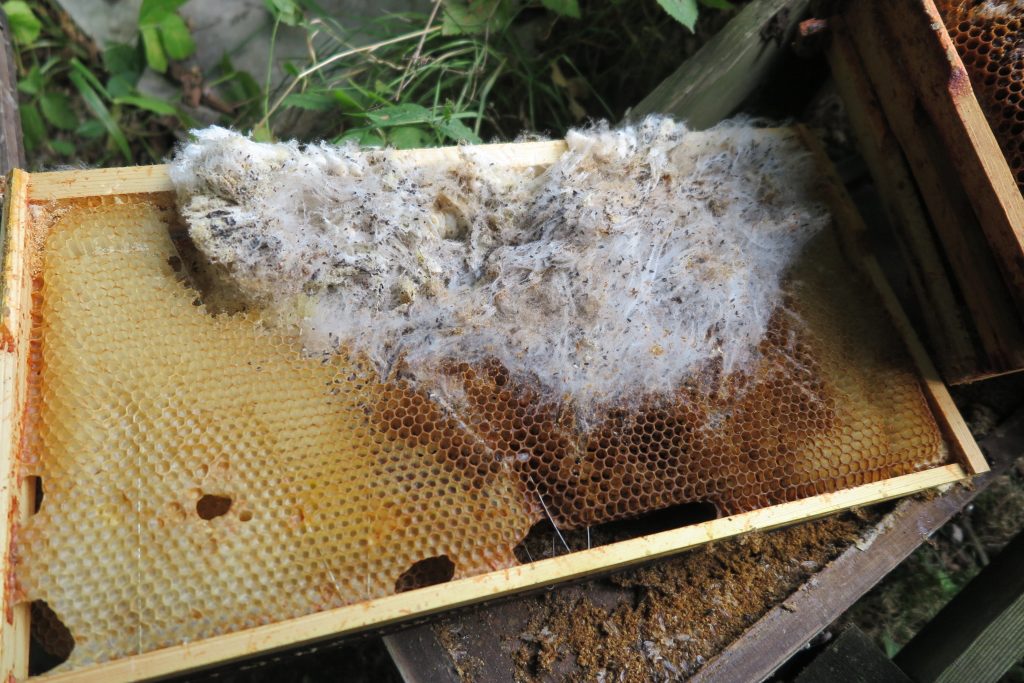New biological wax moth control for USA
Beekeepers in the USA can now save many millions of dollars each year by using B402, a new biological treatment to control wax moth. As a result of rapid and innovative development of the product by honey bee health specialists Vita Bee Health in collaboration with Valent Biosciences Corporation, B402 is now becoming available across the USA.
The new wax moth control product, B402 (also known as Certan), uses Bacillus thuringiensis (Bt), a bacterium commonly found in nature that selectively kills wax moths at the larval stage. The moths, which can destroy honey bee wax combs and even the structure of hives, cause widespread damage and even colony losses for beekeepers. B402 offers efficacy of up to 100% against wax moth larvae.
B402 has recently been approved for use with honey bee colonies by the USA Environmental Protection Agency (EPA) and many individual states have already confirmed that registration, so stock is now being shipped to distributors across the country. B402 is safe to use and harmless to beneficial insects and pollinators. It leaves no chemical residues in wax or honey, and only a single application is necessary to provide complete protection.

Dr Max Watkins, CEO of Vita Bee Health, explained “Bt is a commonly used biological control for many agricultural pests. Together with Valent Biosciences, we faced the challenge of finding a strain that selectively targets wax moths. We sought to improve on B401, an earlier bee-safe product. With Valent Biosciences, well known for quality control and product consistency, we located a strain and formulation of Bt that specifically controls both greater and lesser wax moths (Galleria mellonella and Achroia grisella) while being harmless to bees under this use. Valent BioSciences continues to be extremely supportive in helping us innovate for the benefit of beekeepers.”
Regina Rieckenberg, Vice President of Global Marketing and Business Management for Valent BioSciences, said, “We have worked closely with Vita Bee Health for years and, as a result, have developed valuable knowledge and insights about the honey bee industry. With our extensive expertise in biological products, we were able to team with Vita Bee Health to create this innovative new formulation offering a variety of unmatched benefits.”
B402 is supplied in bottles as a liquid formulation, which is diluted with water and can be sprayed, with a basic hand sprayer, onto honey comb prior to storage. In most cases, one treatment is sufficient to give full protection until the following season. The wax moth larvae ingest the B402 spores which then germinate in their gut and release toxins destroying the larvae.
Notes to editors
Wax moth damage costs
All honeybee colonies face threats from wax moth damage. Adult moths sneak past guard bees to lay eggs in the honey comb. When the eggs hatch, the larvae consume wax, pollen and honey and leave a trail of destruction. The comb is weakened, faeces are left in the hive and wax moth webbing traps and ensnares bees that try to clean up the mess. Nest destruction can happen in as little as two weeks. Even the hive itself can be damaged when wax moths multiply, and their cocoons make indentations in the structure.
Wax moth is an insidious and expensive undercover agent of destruction. Beekeeping losses from wax moth are rarely calculated, but are huge, especially in the warmer states. A 1970s study in southern USA estimated $4-5million per year (more than $18-22 million at today’s prices) and in 1997 up to $5 (today $8) per colony. With the range of more recent challenges faced by bees, it is suspected that losses today are very much higher.
The view of the Apiary Inspectors of America
In supporting the granting of approval of B402 by the EPA, the Apiary Inspectors of America wrote, “Large-scale infestations of greater wax moth larvae often lead to honey bee reproduction concerns, colony loss, and absconding. Annual financial losses attributed to wax moth damage to bee hive equipment has been estimated in the millions of dollars. Many of the current pesticide options to control wax moths in honey bee hive equipment are restricted use; and, all are potential hazards to users. The registration of this product will provide beekeepers a safer and effective method of controlling the presence of this pest.”
About Valent BioSciences LLC
Headquartered in Libertyville, Illinois, Valent BioSciences is a subsidiary of Tokyo-based Sumitomo Chemical Co, Ltd., and is the worldwide leader in the development, manufacturing, and commercialization of biorational products with sales in 95 countries around the world. Valent BioSciences is an ISO 9001 Certified Company. For additional information, visit www.valentbiosciences.com.
About Vita Bee Health
Vita Bee Health, a trading name of Vita (Europe) Ltd, is a mite control and honey bee health specialist. It is the world’s largest dedicated supplier of honey bee health products to the honey and pollination industries. With a rigorous and ethical approach to research and development into honey bee health, Vita has no commercial interests in crop pesticides or crop breeding that may be harmful to honey bees.
Vita promotes sustainable beekeeping through Integrated Pest Management (IPM). Its treatments are designed to inhibit the build-up of resistance and wherever possible contain natural compounds and biological controls that are benign to all but the target pests. For more information, visit www.vitabeehealth.com.
Media Contact
Stephen Fleming at Palam Communications
+44 (0)1635 299116

